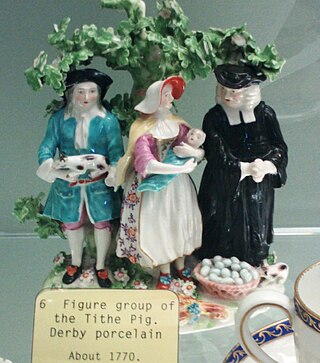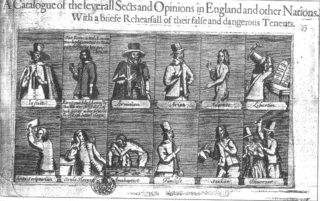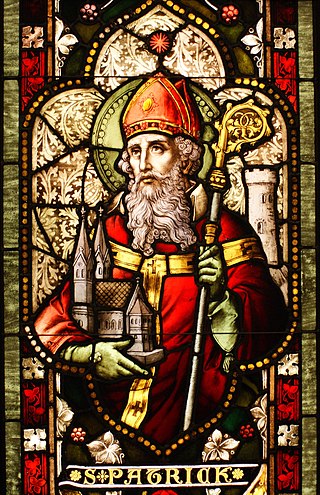
George Fox was an English Dissenter, who was a founder of the Religious Society of Friends, commonly known as the Quakers or Friends. The son of a Leicestershire weaver, he lived in times of social upheaval and war. He rebelled against the religious and political authorities by proposing an unusual, uncompromising approach to the Christian faith. He travelled throughout Britain as a dissenting preacher, performed hundreds of healings, and was often persecuted by the disapproving authorities. In 1669, he married Margaret Fell, widow of a wealthy supporter, Thomas Fell; she was a leading Friend. His ministry expanded and he made tours of North America and the Low Countries. He was arrested and jailed numerous times for his beliefs. He spent his final decade working in London to organise the expanding Quaker movement. Despite disdain from some Anglicans and Puritans, he was viewed with respect by the Quaker convert William Penn and the Lord Protector, Oliver Cromwell.

The Puritans were English Protestants in the 16th and 17th centuries who sought to rid the Church of England of what they considered to be Roman Catholic practices, maintaining that the Church of England had not been fully reformed and should become more Protestant. Puritanism played a significant role in English and early American history, especially during the Protectorate.

The dissolution of the monasteries, occasionally referred to as the suppression of the monasteries, was the set of administrative and legal processes between 1536 and 1541, by which Henry VIII disbanded monasteries, priories, convents, and friaries in England, Wales, and Ireland; expropriated their income; disposed of their assets; and provided for their former personnel and functions.

A tithe is a one-tenth part of something, paid as a contribution to a religious organization or compulsory tax to government. Today, tithes are normally voluntary and paid in cash or cheques or more recently via online giving, whereas historically tithes were required and paid in kind, such as agricultural produce. After the separation of church and state, church tax linked to the tax system are instead used in many countries to support their national church. Donations to the church beyond what is owed in the tithe, or by those attending a congregation who are not members or adherents, are known as offerings, and often are designated for specific purposes such as a building program, debt retirement, or mission work.

Religion in the United States began with the religions and spiritual practices of Native Americans. Later, religion also played a role in the founding of some colonies, as many colonists, such as the Puritans, came to escape religious persecution. Historians debate how much influence religion, specifically Christianity and more specifically Protestantism, had on the American Revolution. Many of the Founding Fathers were active in a local Protestant church; some of them had deist sentiments, such as Thomas Jefferson, Benjamin Franklin, and George Washington. Some researchers and authors have referred to the United States as a "Protestant nation" or "founded on Protestant principles," specifically emphasizing its Calvinist heritage. Others stress the secular character of the American Revolution and note the secular character of the nation's founding documents.
"Separation of church and state" is a metaphor paraphrased from Thomas Jefferson and used by others in discussions regarding the Establishment Clause and Free Exercise Clause of the First Amendment to the United States Constitution which reads: "Congress shall make no law respecting an establishment of religion, or prohibiting the free exercise thereof..."

English Dissenters or English Separatists were Protestants who separated from the Church of England in the 17th and 18th centuries.
Advowson or patronage is the right in English law of a patron (avowee) to present to the diocesan bishop a nominee for appointment to a vacant ecclesiastical benefice or church living, a process known as presentation.
The Religious Society of Friends began as a proto-evangelical Christian movement in England in the mid-17th century in Ulverston. Members are informally known as Quakers, as they were said "to tremble in the way of the Lord". The movement in its early days faced strong opposition and persecution, but it continued to expand across the British Isles and then in the Americas and Africa.
A vestry was a committee for the local secular and ecclesiastical government of a parish in England, Wales and some English colonies, which originally met in the vestry or sacristy of the parish church, and consequently became known colloquially as the "vestry". At their height, the vestries were the only form of local government in many places and spent nearly one-fifth of the budget of the British government. They were stripped of their secular functions in 1894 and were abolished in 1921.

The Tithe War was a campaign of mainly nonviolent civil disobedience, punctuated by sporadic violent episodes, in Ireland between 1830 and 1836 in reaction to the enforcement of tithes on the Roman Catholic majority for the upkeep of the established state church, the Church of Ireland. Tithes were payable in cash or kind and payment was compulsory, irrespective of an individual's religious adherence.
A church tax is a tax collected by the state from members of some religious denominations to provide financial support of churches, such as the salaries of its clergy and to pay the operating cost of the church. Not all countries have such a tax. In some countries that do, people who are not members of a religious community are exempt from the tax; in others it is always levied, with the payer often entitled to choose who receives it, typically the state or an activity of social interest.

Impropriation, a term from English ecclesiastical law, was the destination of the income from tithes of an ecclesiastical benefice to a layman. With the establishment of the parish system in England, it was necessary for the properties to have an owner. This was the parochianus or parson/rector who was sustained by the benefice income while providing personally for the cure-of-souls. The parson was technically a corporation sole. With the passage of time, the benefice came to be considered a piece of property whose holder could discharge the spiritual responsibilities by a deputy and many were appropriated by monasteries or other spiritual corporations. These were bound to provide for a cleric for the cure of souls in the parish but could use any excess income as they pleased. The deputy was often known as the 'vicar'.

Quakers are people who belong to the Religious Society of Friends, a historically Protestant Christian set of denominations. Members of these movements are generally united by a belief in each human's ability to experience the light within or "answering that of God in every one". Some profess a priesthood of all believers inspired by the First Epistle of Peter. They include those with evangelical, holiness, liberal, and traditional Quaker understandings of Christianity. There are also Nontheist Quakers, whose spiritual practice does not rely on the existence of God. To differing extents, the Friends avoid creeds and hierarchical structures. In 2017, there were an estimated 377,557 adult Quakers, 49% of them in Africa.
The Quaker movement began in England in the 17th Century. Small Quaker groups were planted in various places across Europe during this early period. Quakers in Europe outside Britain and Ireland are not very numerous (2023) although new groups have started in the former Soviet Union and successor countries. By far the largest national grouping of Quakers in Europe is in Britain.
The assembly of the French clergy was in its origins a representative meeting of the Catholic clergy of France, held every five years, for the purpose of apportioning the financial burdens laid upon the clergy of the French Catholic Church by the kings of France. Meeting from 1560 to 1789, the Assemblies ensured to the clergy an autonomous financial administration, by which they defended themselves against taxation.

Christianity is, and has been the largest religion in Ireland since the 5th century. After a pagan past of Antiquity, missionaries, most famously including Saint Patrick, converted the Irish tribes to Christianity in quick order, producing a great number of saints in the Early Middle Ages, and a faith interwoven with Irish identity for centuries since − though less so in recent times.
This article details the history of the Catholic Church in Brazil from the colonial era until the modern era. The Federative Republic of Brazil is the largest country in South America. It is the world's fifth largest country, both by geographical area and by population with over 201 million people. Catholicism is the country's predominant faith with approximately 64.6% of the population identifying as a member of the religion. Brazil has the world's largest Catholic population.
Colonial America bastardy laws were laws, statutes, or other legal precedents set forth by the English colonies in North America. This page focuses on the rules pertaining to bastardy that became law in the New England colonies of Massachusetts, Connecticut, and Pennsylvania from the early seventeenth century to the late eighteenth century. The colonies established many laws based on a combination of old English common law and their religious faith. European settlers established rules to guide society upon their arrival in North America. Many of these rules strongly resembled the established guidelines set forth by England. Although the laws differed initially in their creation and enforcement, by the late eighteenth century, the New England colonies and the colony of Pennsylvania had altered their laws pertaining to bastardy to be mirror images of the laws in effect in England.
The Welsh Church Commissioners were set up by the Welsh Church Act 1914 to deal with the disendowment of the Church of England in Wales, as part of its disestablishment. Their task was to ascertain which ecclesiastical assets the future Church in Wales should retain, and which should be transferred to local authorities, and to various Welsh national institutions. They were required to transfer those assets which the Church in Wales was entitled to retain to the Representative Body of the Church in Wales. The remaining assets were to be transferred to the thirteen county councils and four county borough councils which existed in Wales until 1974, and to the University of Wales and its constituent colleges. For various reasons which are explained below, the process took considerably longer than was first envisaged. The commissioners could not ultimately be wound up until 1947. The assets transferred constituted the "Welsh Church Act Funds" of the respective institutions. The county and county borough councils hold the funds for charitable and other purposes. The funds are still in existence.








